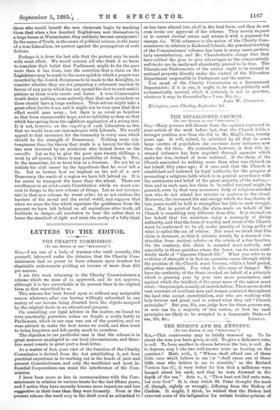LETTERS TO THE EDITOR.
THE CHARITY COMMISSION.
[To THE EDITOR OF THE " SPECTATOR." j 8111,—I am one of a body of trustees who until recently, like yourself, laboured under the delusion that the Charity Com- missioners had no power to force schemes upon trustees for -charitable endowments yielding an income of more than 250 per annum.
I am this week returning to the Charity Commissioners a scheme which we none of us approved, and do not approve, although it is less unworkable in its present than in its original form as first submitted to us.
This scheme has been forced upon us without any assignable reason whatever, after our having willingly submitted to one moiety of our income being diverted from the objects assigned by the original deeds to an educational purpose.
On consulting our legal adviser in the matter, we found we were practically powerless unless we fought a costly battle in Parliament, which in our case was out of the question, and we were advised to make the best terms we could, and then trust to being forgotten and left pretty much to ourselves.
The objection in our particular case is that the scheme is in great measure unadapted to our local circumstances, and there- fore must remain in great part a dead-letter.
As a matter of fact, your view of the function of the Charity Commission is derived from the Act establishing it, not from practical experience in its working out in the hands of past and present Commissioners, and only the wealthiest and most in- fluential Corporations can resist the interference of the Com- mission.
I have been more or less in correspondence with the Com- missioners in relation to various trusts for the last fifteen years, and I notice they have recently become more imperious and less suggestive in their tone than they were formerly. Even in the present scheme the word may in the draft proof as submitted to
as has been altered into shall in the final form, and they do not even invite our approval of the scheme. They merely request us to correct clerical errors and return it with a payment for stamps, &c. With reference to the action of the Charity Com- missioners in relation to Endowed Schools, the practical working of the Commissioners' schemes has been in many cases particu- larly unsatisfactory, and Mr. Chamberlain's charge that they have robbed the poor to give advantages to the comparatively well-to-do can be easily and abundantly proved to be true. The Educational Endowments of the nation ought to be treated as national property directly under the control of the Education Department responsible to Parliament and the nation.
You speak of the Charity Commission as a Government Department ; if it is one, it ought to be made politically and ecclesiastically neutral, which it certainly is not in practice, whatever it may be theoretically.— I am, Sir, &c.,


































 Previous page
Previous page